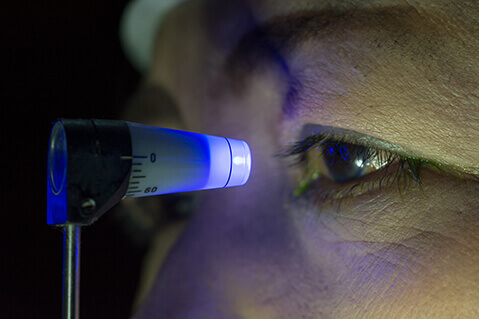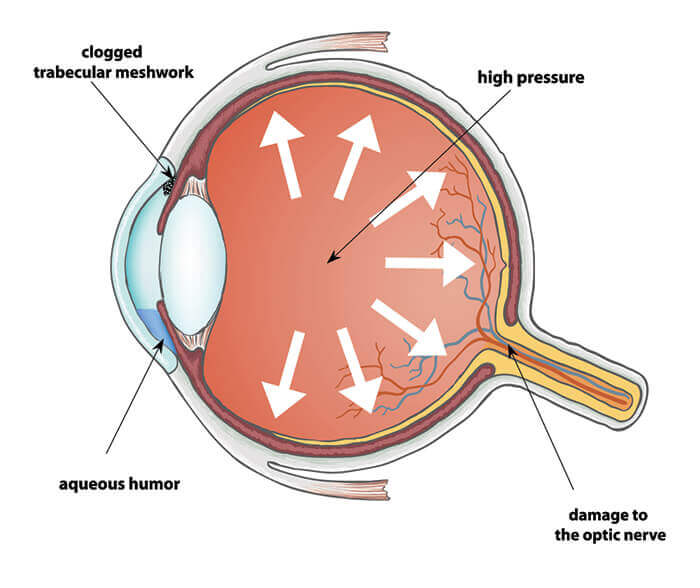Glaucoma is a condition associated with higher-than-normal pressure in the eye. It is characterized by damage to the delicate fibers that make up the optic nerve resulting in slow vision loss that can lead to blindness. Glaucoma affects approximately two million Americans, and half of those people are unaware they even have the disease.
For this reason, Mann Eye Institute puts great emphasis on early detection. Every person over the age of 40 should have a comprehensive eye exam once a year, including a screening for glaucoma.
The exact cause of glaucoma is unknown. But technically speaking, the passages that normally allow fluid within your eye to drain become clogged or blocked, increasing pressure on the optic nerve. The increased pressure can damage nerve fibers and blood vessels, resulting in vision loss.
There are several types of glaucoma, but the two main types are open-angle glaucoma and angle-closure or closed-angle glaucoma. Both are marked by increased pressure in the eye. According to the Glaucoma Research Foundation, open-angle glaucoma is the most common form, accounting for around 90% of all glaucoma cases.
In most cases, glaucoma doesn’t have any symptoms beyond slow vision loss. For this reason, glaucoma screening is an essential part of every comprehensive eye exam at Mann Eye Institute. If glaucoma is detected, our experienced glaucoma specialists will look at the following factors in an in-depth glaucoma evaluation:

Does glaucoma run in your family? Schedule your comprehensive eye exam today to determine your risk for developing this sight-stealing condition.
While there is no cure for glaucoma at this time, it can be controlled and stabilized by maintaining proper eye pressure. It’s important to choose a trusted and experienced doctor for your glaucoma management.
The goal of glaucoma treatment at Mann Eye Institute is to preserve your current level of vision and to prevent further vision loss. Treatment can vary, depending on the type of glaucoma diagnosed, the degree to which the glaucoma has progressed, your underlying risk factors and other variables. Glaucoma treatment falls into the following categories:
Glaucoma is much more complex than most people understand. For this reason, glaucoma subspecialist ophthalmologists train an additional year beyond the four years of ophthalmology residency training. It’s important to choose a trusted and experienced doctor for your glaucoma management.
Glaucoma is one of the leading causes of blindness in the world today. It often has no symptoms – especially in its early stages – earning its reputation as “the silent thief of sight”.

Mann Eye Institute is the first practice in Texas to offer the Voyager Direct Selective Laser Trabeculoplasty (DSLT) system. This state-of-the-art technology represents a significant advancement in glaucoma treatment, offering patients a drop-free alternative with unprecedented precision and convenience.
The Mann Eye Institute is a leading eye care facility with sixteen locations in Humble, West Humble, Houston, Central Austin, North Austin, Sugar Land, Katy, Spring, The Woodlands, Livingston, Bay City, Pearland, Baytown, Tomball, Sun City, and Cleveland, Texas. With various locations in the Houston and Austin areas we can provide the full continuum of care, including; designer eyewear and eye care needs, LASIK eye surgery, cataract surgery, premium lens implants and dry eye treatment options. If you are seeking expert eye doctors in Texas contact us today!
Pearland Office
10223 Broadway St., Ste. J
Pearland, TX 77584
(281) 971-9332
Spring Office
2616 FM 2920 Ste. I
Spring, TX 77388
(281) 353-8300
Tomball Office
14079 FM 2920
Tomball, TX 77377
(346) 701-4029
Katy Office
750 Westgreen Blvd.
Katy, TX 77450
(281) 392-3937
Humble - Deerbrook Office
9802 FM 1960 W, Ste. 110
Humble, Texas 77338
(281) 446-9333
Sugar Land Office
6424 E. Riverpark Dr.
Sugar Land, TX 77479
(713) 580-2525
Humble - S. Memorial Office
18850 S. Memorial Blvd.
Humble, TX 77338
(281) 446-7900
Livingston Office
1601 US-59 Loop North, Ste. 100
Livingston, Texas 77351
(936) 327-3937
Cleveland Office
429 West Southline
Cleveland, TX 77327
(281) 592-4343
Bay City Office
3612 Avenue F
Bay City, TX 77414
(979) 244-1450
Baytown Office
4750 East Freeway
Baytown, TX 77521
(281) 421-2020
South Austin Office
2600 Via Fortuna, Ste. 400
Austin, TX 78746
(512) 327-4123
North Austin Office
4314 W. Braker Lane Ste. 215
Austin, TX 78759
(512) 200-3937
Sun City Office
1530 Sun City Blvd., Ste. 150
Georgetown, TX 78633
(512) 327-3792